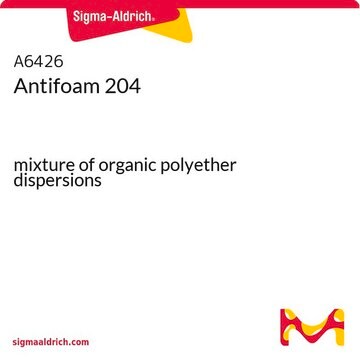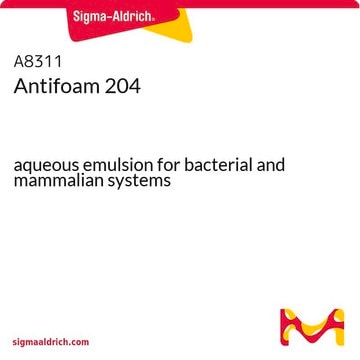81380
Polypropylene glycol
P 2,000
Sinónimos:
PPG
Iniciar sesiónpara Ver la Fijación de precios por contrato y de la organización
About This Item
Número de CAS:
MDL number:
UNSPSC Code:
12162002
PubChem Substance ID:
NACRES:
NA.23
Productos recomendados
Quality Level
form
liquid
mol wt
Mn 1513
refractive index
n20/D 1.451
viscosity
~450 mPa.s(20 °C)
solubility
water: miscible (completely)
density
1.00 g/mL at 20 °C
InChI
1S/C6H14O3/c1-5(8)4-9-6(2)3-7/h5-8H,3-4H2,1-2H3
InChI key
DUFKCOQISQKSAV-UHFFFAOYSA-N
¿Está buscando productos similares? Visita Guía de comparación de productos
General description
Polypropylene glycol is an addition polymer of propylene glycol and water. It is represented by the formula HO(C3H6O)nC3H6OH in which n represents the average number of oxypropylene groups. Polypropylene glycol is soluble in water and in certain organic solvents as aliphatic ketones and alcohols and insoluble in ether and in most aliphatic hydrocarbons.
Application
Polypropylene glycol (PPG)is widely used as an antifoaming agent. For example, it can be used to controlfoam in the production of Bacillus thuringiensis-based biopesticides fromsewage sludge.
It can be used in thepreparation of polyurethane(PU) elastomers. For example, it can be used tosynthesize PU elastomers with good acoustic absorption properties.
PPG-2000 can be used as a soft segment in the preparationof PU-based self-healing polymeric networks. These networks find application in the field of soft electronics.
It can be used in thepreparation of polyurethane(PU) elastomers. For example, it can be used tosynthesize PU elastomers with good acoustic absorption properties.
PPG-2000 can be used as a soft segment in the preparationof PU-based self-healing polymeric networks. These networks find application in the field of soft electronics.
Features and Benefits
- Long and flexible alkyl groups promotechain mobility, which facilitates rapid self-healing.
- The methyl groups present on the sides of thepolymer improve emulsification in water.
Storage Class
10 - Combustible liquids
wgk_germany
WGK 1
flash_point_f
445.0 °F - closed cup
flash_point_c
229.44 °C - closed cup
ppe
Eyeshields, Gloves
Elija entre una de las versiones más recientes:
¿Ya tiene este producto?
Encuentre la documentación para los productos que ha comprado recientemente en la Biblioteca de documentos.
Los clientes también vieron
Zhiyong Zhao et al.
Chemical communications (Cambridge, England), 48(78), 9753-9755 (2012-08-25)
The designed DNA sequences can make DNA-b-PPO undergo in situ transition between diblock and triblock upon pH changes, consequently, induce a morphology-shifting from spherical micelles to nanofibers. This process is reversible and the assembled structures have been characterized by CD
Claudio Poggio et al.
Journal of endodontics, 38(9), 1239-1243 (2012-08-16)
The objective of this study was to evaluate and compare in vitro the decalcifying capability on root canal dentin of 4 different irrigating solutions. Twenty-five freshly extracted maxillary central incisors were selected. The canals were prepared to obtain a total
Jessalyn Cortese et al.
Journal of the American Chemical Society, 134(8), 3671-3674 (2012-02-11)
We show here that complementary interactions can suppress mesoscopic order and thus lead to a counterintuitive change in material properties. We present results for telechelic supramolecular polymers based on poly(propylene oxide) (PPO), thymine (Thy), and diaminotriazine (DAT). The self-complementary systems
Celeste R Brennecka et al.
Journal of biomedical materials research. Part B, Applied biomaterials, 100(5), 1298-1309 (2012-04-20)
This study examines the in vitro characteristics of a crosslinking polymer system for cerebral aneurysm embolization. The polymeric material is composed of poly(propylene glycol)diacrylate (PPODA) and pentaerythritol tetrakis(3-mercaptopropionate) (QT), formulated with the liquid contrast agents Conray™ or Omnipaque™ 300. The
Omnidirectional printing of 3D microvascular networks.
Willie Wu et al.
Advanced materials (Deerfield Beach, Fla.), 23(24), H178-H183 (2011-03-26)
Nuestro equipo de científicos tiene experiencia en todas las áreas de investigación: Ciencias de la vida, Ciencia de los materiales, Síntesis química, Cromatografía, Analítica y muchas otras.
Póngase en contacto con el Servicio técnico





